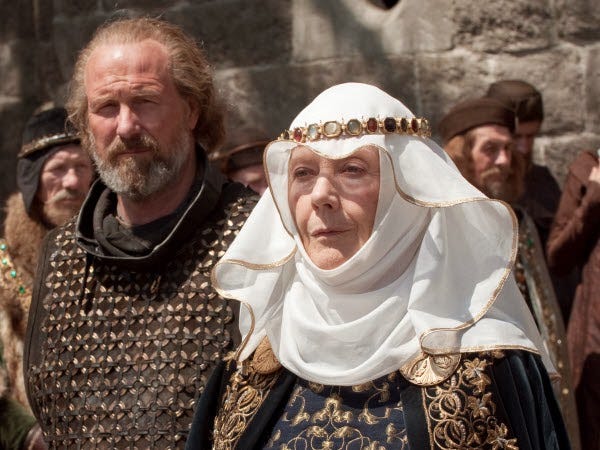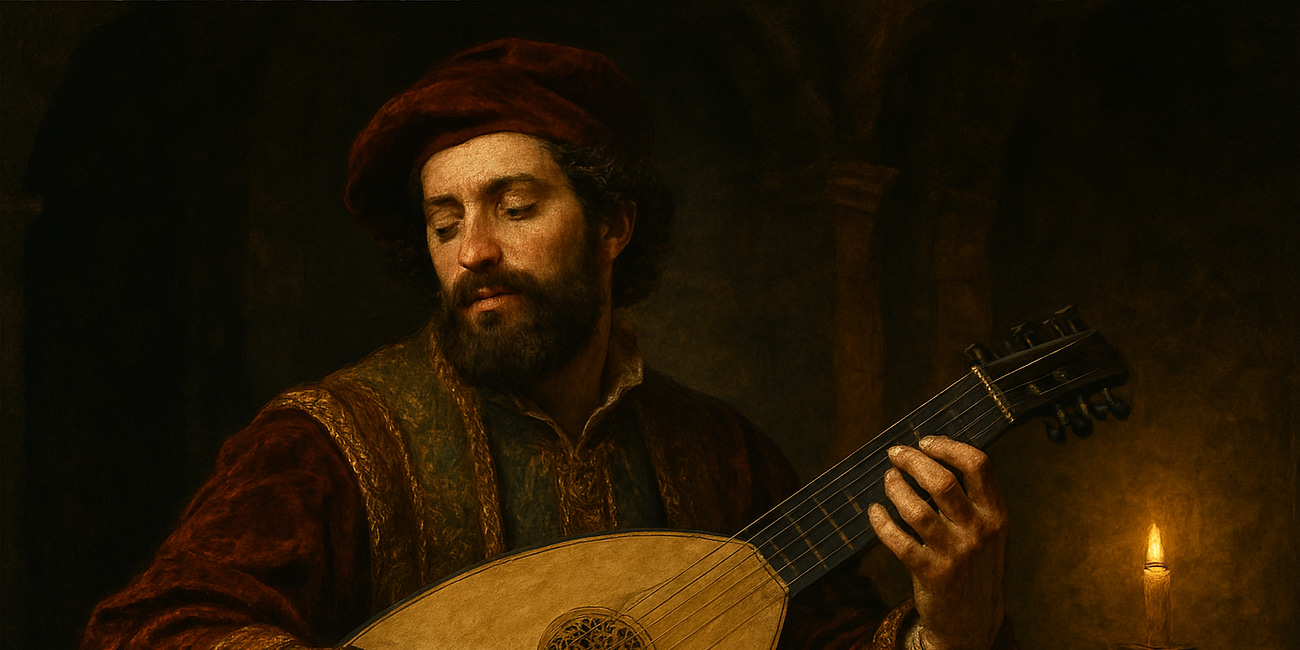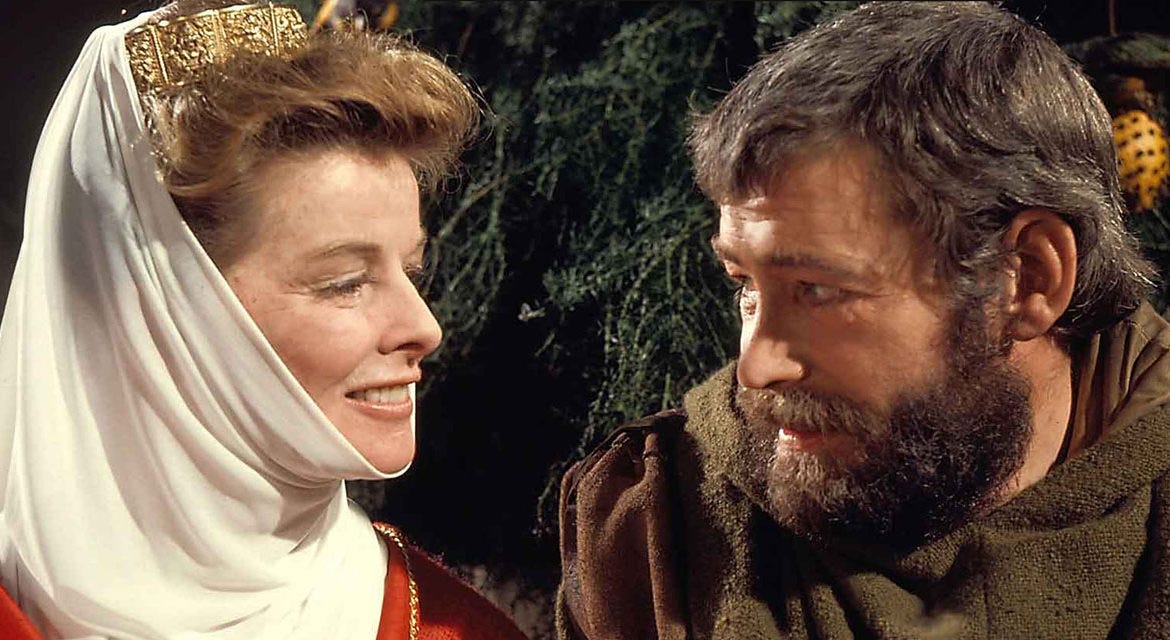A few weeks ago, I published The War Without Love, a short story in honor of CJ Sansom, for a memorial writing event created by Holly A Brown at Medieval Musings. The story featured the troubadour Bertran de Born navigating the tricky political landscape of the conflict pitting King Henry II against his wife Eleanor of Aquitaine and their sons Henry (the “Young King”), Richard, the future “Lionheart,” and Geoffrey.
Today I thought I would recount the history of this fascinating conflict.
The War Without Love
Holly A Brown at Medieval Musings has created a memorial writing event for the author CJ Sansom, who died in 2024. Participants were asked to write a short historical mystery featuring a sleuth and his assistant, honoring Sansom’s style. I hope you enjoy my story The War Without Love.
Eleanor of Aquitaine, King Louis VII, King Henry II
Eleanor of Aquitaine, then Duchess of Aquitaine, was married to King Louis VII of France in 1137, when she was roughly 14. They had a turbulent marriage, and the marriage was eventually annulled in 1152, when she was about 30. Eight weeks later, she married Henry Plantagenet (then 19). In about a year, Henry would become King of England and Duke of Aquitaine. She would bear him eight children, five sons and three daughters. William IX died when he was around 2, and there followed Henry (the eventual “Young King”), Matilda (Duchess of Saxony), Richard (eventual “Lionheart” and King of England), Geoffrey II (Duke of Brittany), Eleanor (Queen of Castile), Joan (Queen of Sicily), and John (eventual King of England).
Eleanor and Henry’s marriage would also be turbulent. Henry had many sons but jealously guarded his power. Even as adults, his sons had little to no money or lands.
Eleanor and William Marshal
In 1168, Henry was beginning to think about how to sort out his various sons’ inheritances. While he was very much the enemy of King Louis (not to mention married to his ex-wife), he needed Louis’ permission for certain arrangements, as Louis was his liege lord, and Henry owed him homage for his lands in Normandy, Anjou, and Aquitaine (more on the liege lord business here). Awkward…
In March of 1168, Henry was summoned to meet with Louis. While he was away, a party of rebels, led by Guy de Lusignan, the future King of Jerusalem, ambushed Eleanor as she traveled. The young William Marshal, destined to become ‘the greatest knight who ever lived,’ saved her but was captured in the process. Eleanor ransomed him; he would remain loyal to the Plantagenet family (or at least some faction of them) for fifty years. But it is Eleanor he truly served.

In June of 1170, Henry the son is crowned co-king by his father. The younger Henry becomes known as “the Young King,” but he is king in name only—he is given no lands or money to speak of.
In December 1170, Archbishop Thomas Becket is murdered in the Canterbury Cathedral, after some of King Henry’s knights misunderstand his grousing about his conflict with Becket and murder him. (“Will no one rid me of this turbulent priest?” is the famous quote). All of Europe is outraged.
Henry continues to leave his sons uncertain about their inheritance, and their frustration, and Eleanor’s, continues to grow. In 1172, Henry the Young King marries Margaret, the daughter of King Louis. And for some time now, Richard has been engaged to Alys, another of Louis’s daughters. The intertwined nature of these two families is hard to overstate, even as they are mortal enemies.
The inciting incident of “the war without love” came in 1173. Henry’s son John is promised in marriage, and Henry decides to give away three castles and lands that are to belong to Henry the son. The Young King is outraged and slips away in the night to begin his rebellion.
It is at this point that Eleanor decides to join in—she sends her sons Richard (then 15) and Geoffrey to Paris to join in the Young King’s rebellion, which is funded and fomented by Philip.
Here’s the contemporary chronicler Roger of Hoveden:
Immediately after Easter, in this year, the whole of the kingdom of France, and the king, the son of the king of England, Richard his brother, earl of Poitou, and Geoffrey, earl of Bretagne, and nearly all the earls and barons of England, Normandy, Aquitaine, Anjou, and Brittany, arose against the king of England the father, and laid waste his lands on every side with fire, sword, and rapine: they also laid siege to his castles, and took them by storm, and there was no one to relieve them. Still, he made all the resistance against them that he possibly could: for he had with him twenty thousand Brabanters who served him faithfully, but not without large pay which he gave them.
Then seems to have been fulfilled this prophecy of Merlin which says: "The cubs shall awake and shall roar aloud, and, leaving the woods, shall seek their prey within the walls of the cities; among those who shall be in their way they shall make great carnage, and shall tear out the tongues of bulls. The necks of them as they roar aloud they shall load with chains, and shall thus renew the times of their forefathers.”
Eleanor’s betrayal of Henry scandalizes everyone, for in medieval terms, it is a traitorous act; Henry is her king and her husband, and (in medieval thinking) ought to obey him in all things. But Eleanor is Eleanor. What might be her reasons? Is it because Henry has mistresses on the side (Rosamund Clifford, especially)? He does have mistresses, but it does not seem to be a problem for Eleanor. Is it because Henry has been jockeying with the lords of Toulouse in a way that might lead to Eleanor losing control of Aquitaine? This seems warmer, and likely a good part of it. But I believe the death of Becket may have been a break for her - if Henry will do this, what would he not do? My sense is that she decided then it was time for him to go and was just biding her time. I see it as the seed that grew into this ‘war without love,’ and from there to the final conflict(s) between Henry and his sons, that will lead to the death of Henry the Father and, eventually, most of the remaining sons.
Richard is sent to war and has his first battle at Drincourt; he is about to turn 16. The war drags on, but King Henry is wealthy and powerful and has the upper hand. Then Eleanor is captured, riding for Paris dressed as a man. This was surely an inflection point in Richard’s life; he must step fully into adulthood and the leadership of the rebellion.
There are negotiations and rejections, back and forth. Henry is fighting two battles, this one in France, and one a rebellion in England. But he goes to Canterbury, walking to the Cathedral barefoot, on cut and bleeding feet, and does penance. It works. The next day, the rebellious King of the Scots is captured, and Henry is free to prosecute the war against his sons with his full attention.
Richard retreats to the castle fortress of Taillebourg, while a peace is negotiated with the brothers and Henry; the peace excludes him specifically. Eventually Richard realizes he is beaten, and throws himself at his father’s feet in tears, begging forgiveness. Which is given.
The end of the rebellion
In early 1175, Henry sends Richard to Aquitaine to destroy the rest of the rebels and their castles, a task which would take Richard the next eight years. Henry the Young King got a good settlement and money and spent the next eight years at tournament. Eleanor would be held prisoner under house arrest, held hostage for the good behavior of her sons. She would remain prisoner for almost 15 years, until Henry’s death.
And that is the end of the rebellion. Almost.
The conflict went into remission, but it did not disappear. In 1183, it flared up again. This time, the Young King went to war with Henry and Richard was on the side of his father. This time, brother against brother. By the summer, the Young King had been hunted near death in the south of France. He contracted dysentery and died, but not before he had pillaged a monastery in Rocamadour, stealing the legendary sword Durendal, famous from The Song of Roland. The Young King asked William Marshal to take his cloak to the Holy Sepulchre in Jerusalem, which Marshal did in fact do. Durendal (according to legend) become lodged in a rock in Rocamadour, where the sword was stolen in 2024.
Richard would eventually come into conflict with his father again and make war on him with Louis. Richard and Louis ran Henry to ground, and negotiated a settlement to the end of the war, very unfavorably to Henry. He was ill at the time and died just after the settlement in 1189, and Richard became King of England.








